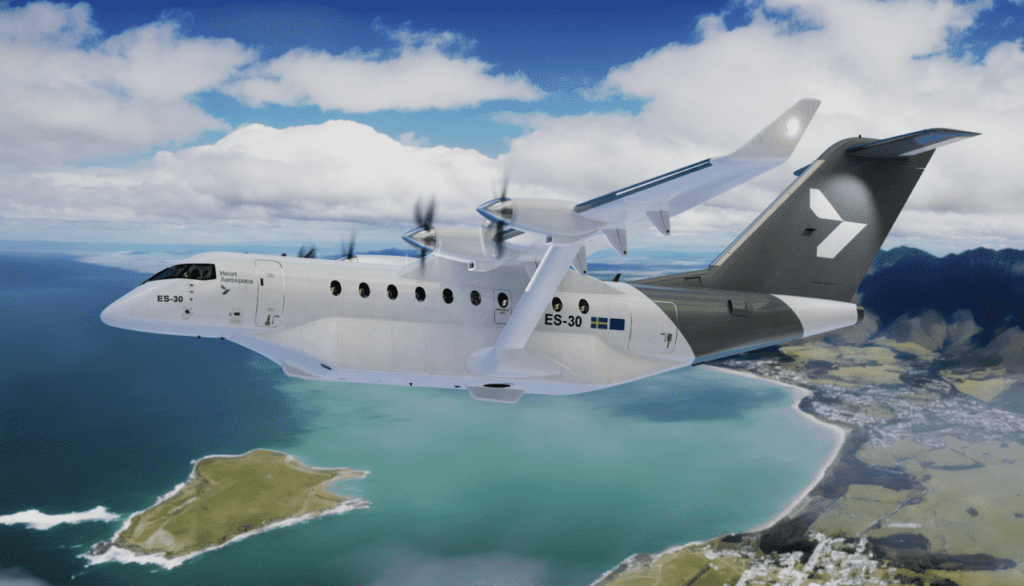
Heart Aerospace, a Swedish electric airplane developer, announced that it is a long-term partner of Air New Zealand’s Mission Next Gen Aircraft initiative. (Photo: Heart Aerospace)
Air New Zealand has recently selected Swedish electric aircraft developer Heart Aerospace as another one of its partners for developing a brand-new electric regional airliner. This long-term partnership will allow Heart Aerospace to work closely with Air New Zealand as it develops new, efficient regional aircraft to be utilized on short domestic flights.
Air New Zealand is its country’s largest carrier, with just over 100 aircraft in operation. While it flies many wide-body and mainline narrow-body aircraft such as the Boeing 787 Dreamliner or A320 Family, the carrier also operates many short-haul, domestic flights using regional aircraft like the ATR 72-600 and the Bombardier Q300. However, as these fleets age (especially the Q300 fleet, which has an average age of 15.8 years), the airline is using innovation to identify and help create modern, environmentally-friendly replacements for existing aircraft.
From this cause sprouts Air New Zealand’s Mission Next Gen Aircraft, a program that collaborates with several aviation technology and manufacturing companies with the goal of creating a zero-emission regional aircraft. The group hopes to have a demonstrator flight—for either cargo or passenger operations—as early as 2026. While Air New Zealand has curated the program, it has gained partners across the world, namely Airbus, ATR, Embraer, and Universal Hydrogen. This consortium will use electric and hybrid-electric technology to make sustainable flight a reality in New Zealand.
In addition to Embraer’s joining the Mission Next Gen Aircraft initiative, Air New Zealand signed an agreement to join Embraer’s Energia Advisory Group this week. “Having Embraer as one of our long-term partners will grow our collective understanding of zero emissions aircraft technology as it develops and will give them the confidence they are developing a product that’s viable for us,” commented Air New Zealand’s Chief Sustainability Officer Kiri Hannifin.

“Having Embraer as one of our long-term partners will grow our collective understanding of zero emissions aircraft technology as it develops.” (Photo: Embraer)
Heart Aerospace’s biggest contribution to the Mission Next Gen Aircraft program may be the ES-30. This electric aircraft is designed to operate regional flights while carrying approximately 30 passengers. Driven by electric motors, the aircraft will have a range of 200 kilometers (about 124 miles) when flying solely on electric power. However, the ES-30 has the potential to fly up to 400 kilometers (about 259 miles) with 30 passengers or even up to 800 kilometers (about 500 miles) with 25 passengers.
Both parties have expressed enthusiasm and optimism for this partnership. Anders Forslund, co-founder and CEO of Heart Aerospace, explained, “Air New Zealand is truly leading the way with its efforts to reduce emissions from air travel, and we are impressed by the diligence with which they approach this challenge. We could not be prouder to have been selected as a long-term strategic partner on their journey towards net zero. At Heart Aerospace we say the real innovation is getting it done, and together we will.”
Beyond this program, Heart Aerospace has made additional milestones toward sustainable flight that make it a perfect fit for Mission Next Gen. With the assistance of investments from major players in the industry like Air Canada, Mesa Air Group, Saab, and United Airlines Ventures, the company has already performed the first flight of a scale model of its ES-19, a regional aircraft that will be able to fly 19 passengers without emitting any carbon.